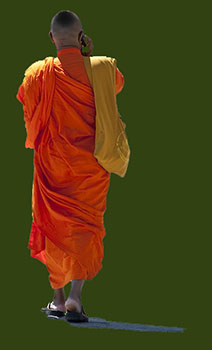Conference held by Jaya Yogācārya on June 14th, 2019 during meditation class
Many aspirants in the spiritual path think there are two kinds of paths.
Paths within life and paths outside of life.
Paths outside of life are the paths of yogis, monks, who withdraw from the world in āśrama आश्रम, caves or monasteries to practice. Paths within life are the paths of our lives in this century’s world.
Some of you wonder if paths within life can be as effective as paths outside of life.
This apparent difference is in fact illusory.
Masters will tell you there is only one path, the path you live through your own existence.
Whether you are a monk or the head of a family, the path is always within life.
It is simply the kind of life that is different.
The life of the head of a family can lead somewhere, and the failed life of a monk doesn’t lead anywhere.

The question is not to distinguish between a life outside of the world and a life within the world, but between a successful life and a failed life.
You lead your life through your body, your thoughts, your feelings, your fears, until you accomplish what is to be accomplished and discover what is to be discovered.
Each one of us has to succeed in one’s own life.
If for you, succeeding in life is being Bhakti भक्ति in an āśrama, then go live in an āśrama. If for you, succeeding is creating a start-up company in New York, go live in New York.
Being a yogi or a monk is not the primary question.
You have to succeed in your life.
What does that mean?
Social and cultural conditioning since childhood engraves mental habits in us. Conditioning creates models, expectations in us which may in the end be foreign to who we truly are.
For many people, succeeding in life means getting married, having children, earning a lot of money and/or becoming famous.
However, when you listen to them, most of them feel frustrated, unfulfilled, with feelings of failure despite all their efforts.
Many of them have lived their lives in ignorance, be it during the events or in their relationships to others.
This need for fulfillment or a successful life requires working on self-knowledge and acting.
But people reach maturity or death day after day without preparation.
Few of them walk calmly toward death and are able to say they succeeded in life. This is possible with a simple and harmonious life however; you don’t necessarily have to have an exceptional destiny.
Succeeding in life means succeeding in "one’s own" life first.
The first Sādhana साधन (spiritual practice) of life consists in "finding back oneself" if one has become foreign to oneself. This requires understanding what our own true needs are.
If you liked dancing and were taken to soccer practice as a child, then it is time to dance! And conversely.
Please notice that the expression is "finding back oneself ".
This refers to a fundamental concept of Vedānta वेदान्त.
Our true nature is already there and is not based on causality, whereas it is the case for our subjective and temporary life story.
In Vedānta, this refers to two concepts: Dharma धर्म and Svadharma स्वधर्म.
Dharma is, first and foremost, the laws that govern the universe and make the world what it is...universal laws that science rediscovers. See conference "Spiritual Laws". Science rediscovers them because they are already there.
So, there is a general dharma peculiar to human beings.
If you drive fast under the rain, there is a high risk that you are going to slide off the road. If you drink alcohol or smoke excessively, say goodbye to health.
Because you were born one day, you are going to have to die.
In the Hindu tradition, there is an overtone to dharma which implies that one should behave according to the moral precepts of a successful life.
This is the notion of Puruṣārtha पुरुषार्थ which means "goal of human existence" and which divides human life into four stages (Dharma or duty, Artha अर्थ or prosperity, Kāma काम or pleasure and Mokṣa मोक्ष or liberation).
But beyond these notions, dharma is first of all a pragmatical and scientific point of view on the laws that govern us. So, dharma indicates a practical and concrete behavioral lifestyle.
Understanding these laws in order to psychologically govern our lives is much more difficult.
There are universal laws in the behavior of human mind.
Without a deep knowledge of its mechanisms, here again life becomes risky.
Physical laws are replaced with opinions, religious or non-religious opinions, moral or non-moral opinions, opinions from the media or ideological opinions, all relative opinions of the moment.
Today, claims for freedom of expression and action defy the laws that have always governed us.
We relegate these laws to outdated doctrinal, religious, moral values.
Even if they have often been used abusively by interest groups, it is not because these laws have been diverted that they lose their value.
They existed before you and will still exist after you.
Millennial wisdom has understood this a long time ago.
With dharma, you become powerful and free, against dharma, you can’t do anything.

Svadharma is the personal dharma, unique to each human being.
The dharma of a fish is not that of a bird.
The dharma of Claire is not that of Jean.
Too often, people lose sight of their svadharma and don’t remember what their purpose is, what their true place, in evolution but also in their own life, is.
So, all the work will consist in discriminating between what is neurotic and illusory in us and what is truly us.
This does not mean judging your current life negatively thinking that your life cannot be successful because until now, you still don’t have this feeling of fulfillment.
You never know what tomorrow will bring.
All the hardships you are going through or you have just been through in your current life may appear to be a benediction one day.
Maybe one day, you will look at yourself respectfully and gratefully and will be able to say: "Yes, I had a successful life, it was not easy, but I lived a fulfilled life".
Many people today think that they are their own master, as they are free to experiment and have many degrees and material and technological means.
But let us not forget we are the product of today’s world.

If we accomplish our existence in this world without considering the millennial spiritual legacy of human societies, we run the great risk of failing at our dharma.
A life can be successful only in accordance with dharma and never by violating it.
The work of the spiritual searcher is also to recognize dharma and its laws.
You cannot look for altered states of consciousness, transcendental experiences, without this preliminary step.
Are you in accordance with the laws of the universe or do you violate them all the time?
The root of the word Dharma is "dhar" which means "to hold, maintain, support". Hence, Dharma is what supports existence.
The word Adharma अधर्म means "deprived of dharma".
Hindu sacred texts predicted the advent of a future adharma world, a world deprived of dharma, many times.
A world deprived of dharma is a world where human beings will have great difficulties in establishing themselves in Ātman आत्मन्, that is in contacting the absolute and unchanging part inside of them.
They will remain even more trapped in time and causality, in an endless race for blind development.
Just take a look around you.
Knowing who one is is necessary to accomplish one’s life path.
If you are a lion, you cannot pretend to be an eagle or a chaffinch. Your lion’s dharma must be accomplished, or you will never be able to establish yourself in your soul and know your vibratory signature.
Everyone needs to understand one’s svadharma.
Dreams, lies you have been feeding yourself for so long with endless comparisons, obstruct your vision of yourself.
It seems that looking for spiritual realization and having a successful secular life are
two different pursuits. But it is not the case.
Succeeding in one’s secular life requires the deployment in time of the cause-and-effect process, in accordance with laws of the universe and its manifested nature.
Looking for spiritual realization consists in following a path where we practice a certain number of disciplines in preparation for awakening.
But there should not be any separation between your life and practices. They all overlap. You cannot dissociate spiritual practices from life’s practices.
However, do not think that awakening is a process based on causality.
For Vedānta, accomplishment is already there because it is beyond time, beyond the relativity of becoming.
What was born must die.
The state of spiritual awakening, state of absolute consciousness, cannot undergo this process. The full realization of consciousness, of this reality that is already there, cannot obey the process of appearance and disappearance.
It just hasn’t been discovered by you yet.
Let us go even further.
This reality is not in you.
It is You!
Hari Om Tat Sat
Jaya Yogācārya
Bibliography:
– "Lumière sur le chemin" (Light on the Path) by Swami Muktananda, Trédaniel Editions.
– "Tu es Cela" by Arnaud Desjardins, La Table ronde Editions
– "Contemplez ces vérités" (Ponder these Truths) by Swami Chidananda, Terre du Ciel Editions
– Adaptation and comment by Jaya Yogācārya
Translated by Stephanie BOSCO
©Centre Jaya de Yoga Vedanta, Réunion Island


